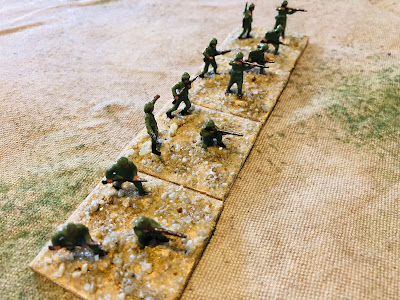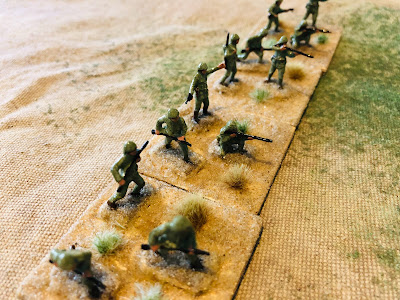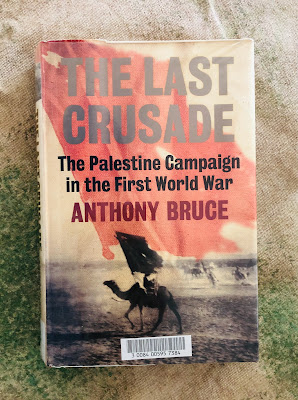In preparation for my next project, the WW1 Palestine Campaign, I painted a couple of units to help decide the best way of painting the 20mm soft plastic figures and also how best to finish the bases. For the baseI was originally just going to use a painted finish and my first test took too long and the effects were unsatisfactory. The alternative was to use sand, either a fine sand or coarse sand, and I tested these on a couple of units.
 |
| An overhead photo of the test units, fine sand at the back and coarse sand in the front. |
Out of the two tests, my preference was for the fine sand, but the bases looked a bit plain. I had a few grass tuffs stashed away which I added and these and they provided look I wanted. It was important that the finished base worked well with my arid tabletop cover I use with my Ancient armies as I wanted to avoid making another cover.
 |
| A closer look at the coarse sand finish. |
 |
| A closer look at the fine sand finish with grass tuffs added. |
In terms of painting the figures I am opting for a very simple and quick approach:
- Paint the whole figure the uniform colour and add brown around the face and neck. More often than not, I will repaint the helmet or hat.
- Paint boots and leather items (eg holsters).
- Dry brush using a light sand colour to help highlight any detail.
- Paint the gun. Normally a dark brown.
- Paint the face and hands.
- Apply a coat of PVA glue which gives a gloss look.
 |
| Not a lot of detail on these figure which I prefer as it keeps the painting simple. The figures are HaT WW1 Turkish Infantry. |
I was returning some borrowed books at the local library today and saw "The Last Crusade - The Palestine Campaign in the First World War" by Anthony Bruce on the shelf. It has been on my list to get and I quickly borrowed it. If it turns out to be a good read I may try and buy myself a copy for future reference when creating campaigns or linked games.
 |
| Recently borrowed from the local library. |





I think on balance you’re right about the fine grain sand. The thicker grain looks good for rockier terrain, but in one of the shots it looks like giant crystals.
ReplyDeleteAnyway, I’m looking forward to the new campaign. If I was to do WWI, this is the theatre I’d be interested in doing.
Yes, the light does occasionally catch the grains of sand and they look crystal like. I did consider doing a wash over them, but that would only add to the time taken to prepare the base.
DeleteIt is interesting reading about the campaign. The armies seemed to battle the the harsh environment more than themselves.
I agree the fine sand finish looks better but the coarser sand would make a good alternative / supplement to grass tufts i.e., small 'blobs' of glue and coarse sand to break up the plain sand effect - perhaps even some combination blobs coarse sand and grass?
ReplyDeleteAdding a bits of coarse sand would certainly help break up blank areas.
DeleteI too would add in some areas of coarser grit and then put the tufts of grass in with it, but then that's the sort of approach I take with my basing. It works for me but admittedly it does take longer.
DeleteI have The Last Crusade on my bookshelf, and it's excellent.
ReplyDeleteThe book A Peace to End All Peace is also useful for an overview. https://us.macmillan.com/books/9780805088090
...as is Enemy on the Euphrates. https://saqibooks.com/books/saqi/enemy-on-the-euphrates-2/
Michael Scott's sadly quiet blog on the Mesopotamia theatre.
http://www.michaelscott.name/ww1/ww1blog/ww1blogpost009.htm
The FWW in the Middle East has tempted me for a long time, and I may get to it yet. Good luck with your project.
Thanks for the other suggested reading and link, which I will investigate.
DeleteAlthough I love to own books I regularly use my local lending library - if only to show the local council that there’s a demand for a public lending library service.
ReplyDeleteCheers,
Geoff
They are a useful resource. Quite often I like to own one book on a period I wargame, but rely on the library for other books.
Delete